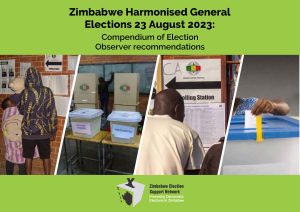Systems of Governance are sets of political institutions by which governments are organized in order to exert power over body politics. ……………. : more
Systems of Governance: What options for Zimbabwe?
Electoral Systems Reforms-Which way for Zimbabwe?
Post election conflicts currently bedeviling Zimbabwe have generated fundamental questions about the extent to which winner-take-all Fast Past the Post electoral frameworks are still relevant in Zimbabwe……………….. : more
Summary of Strengths and Weaknesses of Electoral Systems
Summary of strengths and weaknesses of electoral systems…. : more
Priority Areas for Electoral Reforms in View of Impending By- Elections and Constitutional Referendum
The Zimbabwe Election Support Network has proposed a series of further reforms to the electoral laws of Zimbabwe. However while all of these changes should be put in place prior to the holding of………………… : more
Zesn Position Paper On The Funding Of Political Parties In Zimbabwe 2009
The financing of political parties is generally considered to be one of the critical factors for the success of multiparty democracy. In the case of the public funding of political parties, Friedman states that…………… : more
Summary of Electoral Reform Proposals
Some amendments were made to the Electoral Act in the prior to March 2008 e.g. requiring posting of election results outside polling stations and constituency tabulation centres………… : more
An analysis of Electoral reforms agreed to by parties to the GPA and the newly constituted Zimbabwe Electoral Commission
In 2008, Zimbabweans welcomed the signing of the Global Political Agreement between the three political parties in Zimbabwe namely MDC (T), MDC (M) and ZANU PF. This agreement has led to considerable peace and stabilityin Zimbabwe. While the agreement was a positive development, its implementation has …. : more
Ballot Update, Issue no 15 September 2010
The month under review saw elections remain high on the political agenda as evidence by various media reports on Zimbabwe’s readiness for elections and the subsequent instruction by President Mugabe to “budget for elections in 2011”. In addition, COPAC concluded the constitutional Reform Outreach process in most parts of the country except for Harare. Harare witnessed open……. : more
Opportunity and Risk in the Proposed Polling Station-Based
One of the major features of the proposed electoral reforms is the possible introduction of a localised voting system which will be conducted using polling station-based voters’ rolls. This means a voter will only vote at the polling-station at which his or her name appears on the voters’ roll. This is significantly different from the present system whereby voters can vote at any polling station within the ward…….. : more
Electoral Law Must Prohibit State Officials’ Public Statements
Elections in Zimbabwe have always been marred by acts of violence and intimidation. As far back as 1980, when Zimbabwe held its first democratic elections, there were complaints of violence and intimidation. At the time, the euphoria brought by independence overshadowed the violence that had taken place. Although…….. : more
